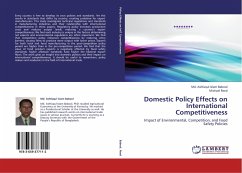Every country is free to develop its own policies and standards. Yet this results in standards that differ by country, creating problems for export manufacturers. This study investigates technical regulations and standards in manufacturing industries and their relationship with international competitiveness in three papers. Regulatory policy increases production costs and reduces output levels, reducing a country s export competitiveness. We find each industry is unique in the factors determining net exports and environmental regulations are often important. We find that competition policy enhances competitiveness by reducing entry barriers; causing firms to produce more output with lower prices. Exports for both total and food manufacturing in the post-competition policy period are higher than in the pre-competition period. We find that the value of food product exports is negatively affected by food safety standards: higher aflatoxin standards have higher the bilateral export flows. The work gives an insight into domestic policies and their impact on international competitiveness. It should be useful to researchers, policy makers and academics in the field of international trade.

